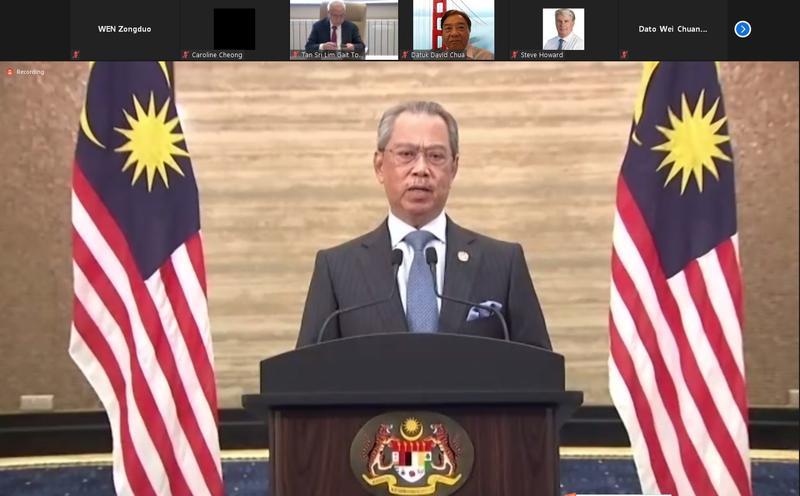 Malaysian Prime Minister Muhyiddin Mohd Yassin addresses the opening session of the 2020 World Chinese Economic Summit (WCES) held Dec 21 in Kuala Lumpur with online participants as well. PROVIDED TO CHINA DAILY
Malaysian Prime Minister Muhyiddin Mohd Yassin addresses the opening session of the 2020 World Chinese Economic Summit (WCES) held Dec 21 in Kuala Lumpur with online participants as well. PROVIDED TO CHINA DAILY
Global cooperation and renewed commitment to multilateralism are needed to restart the global economy while securing public health amid the pandemic, government and industry leaders said in an international forum on Monday.
Key speakers at the 2020 World Chinese Economic Summit also stressed China’s key role in rebuilding the global economy, noting its success in combatting COVID-19 and its commitment to help other developing economies.
“As a key proponent of the multilateral trading system, China has been a voice of reason and moderation throughout this crisis, calling for countries to ensure that emergency measures introduced to mitigate the risk associated with the pandemic did not disproportionally affect trade and investment flows,” Malaysian Prime Minister Muhyiddin Yassin said in the opening keynote session.
ALSO READ: Strong recovery ready to bolster global economy
Muhyiddin said Malaysia resonates strongly with China’s vocal views that the COVID-19 outbreak should not be used as an excuse to enforce insularity and inward-looking policies. He added that Southeast Asia’s third biggest economy will continue to believe in “free, fair and open” trade and investment and called the world to observe fundamental rules governing global trade and exchanges without impediments of protectionism and unilateralism.
China has been a voice of reason and moderation throughout this crisis, calling for countries to ensure that emergency measures introduced to mitigate the risk associated with the pandemic did not disproportionally affect trade and investment flows.
Muhyiddin Yassin, Malaysian Prime Minister
It is of utmost importance that governments continue to remain true to fundamental philosophies and rules that govern international trade, which in turn provide certainty and predictability for businesses, he said.
Shaukat Aziz, former prime minister of Pakistan, said that no country can attain its “true economic potential” by looking inward.
He said the pandemic should serve as a wake-up call to reach out to others and not to use this event as an excuse to enforce protectionist and inward-looking policies.
Tan Sri Lee Kim Yew, WECS founder and patron, and executive chairman and founder of Country Heights Holdings Berhad, said he hoped global collaboration will be implemented in earnest to overcome difficulties in building a better and shared future for all.
Organizing Chairman Tan Sri Michael Yeoh, also president of Ksi Strategic Institute for Asia Pacific, pointed out opportunities within the crisis such as digitization for sustainable development and enhanced connectivity.
Zhang Xiaoqiang, executive vice-chairman and CEO of the China Center for International Economic Exchanges, noted China has assumed responsibilities as a large country in providing medical materials and making its vaccines publicly available products.
The internet of vehicles, industrial internet, intelligent transportation, and the construction of smart cities will greatly promote sustainable development, he said.
Fan Gang, president of China Development Institute, also said multilateralism and the Belt and Road Initiative will promote global development.
Wang Huiyao, president at the Centre for China and Globalization, agreed that the global pandemic has also led to a “reboot of multilateralism”, with countries all over the world understanding the need to work together against COVID-19.
Speaking at a panel discussion, he cited the signing of the Regional Comprehensive Economic Partnership as one of the signs that China and the rest of the world are moving toward multilateralism.
Wang and several other panelists noted that climate change is another challenge that countries can work together, noting that leaders of China and the United States are both committed to lowering carbon emissions.
ALSO READ: Asia's unequal recovery sounds alarm for global rebound
Danny Alexander, vice-president and corporate secretary of the Asian Infrastructure Investment Bank, said climate change is one of the key sectors that AIIB will focus on in the next few years.
He said the multilateral development bank also aims to invest in building connectivity and technology infrastructure and private capital mobilization. By prioritizing these sectors, Alexander said, countries can address not only the pandemic but also future challenges.
This year’s summit theme was “Connecting Business, Promoting Shared Prosperity and Sustainability in the Post COVID New Economy”. The hybrid event was held in Kuala Lumpur and organized by KSI Strategic Institute for Asia Pacific.
Throughout the events, panelists discussed China and the world in the age of disruption and the post-COVID new normal, enhancing connectivity and business cooperation in the BRI, the digital Silk Road, startups and youth entrepreneurship, smart cities and tourism development, women in business and leadership, as well as maximizing opportunities and collaboration in the Guangdong-Hong Kong-Macao Greater Bay Area and the Association of Southeast Asian Nations.
Malaysia has benefited from the BRI and looks forward to closer collaboration in the new era, said Chairman of Port Klang Authority and Secretary-General of Malaysian Chinese Association Chong Sin Woon.
Minister of Transport Wee Ka Siong, in his luncheon presentation, said Malaysia embraces partners from all across the region to reach not only to ASEAN but to all over the world.
READ MORE: Global recovery to be long, uneven, uncertain
Contact the writer at prime@chinadailyapac.com


